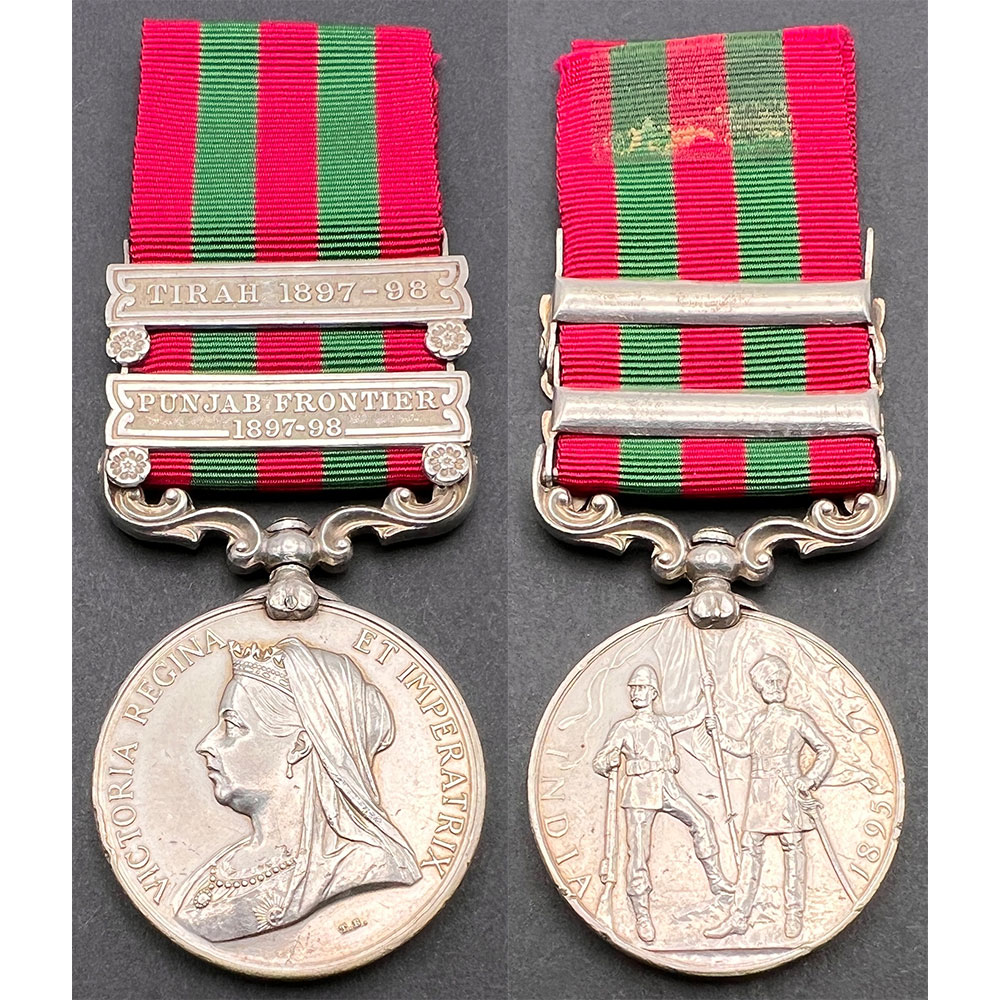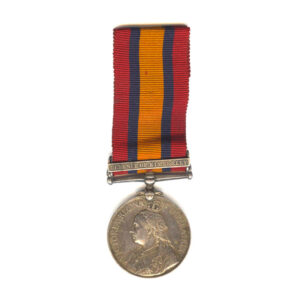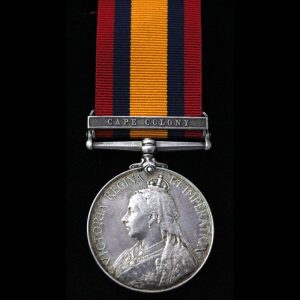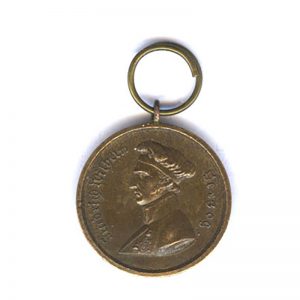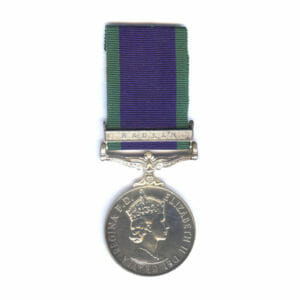Description
India General Service Medal, 2 bars, Punjab Frontier 1897-98, Tirah 1897-98, 5089 Pte William Bremner, 1st Bn Gordon Highlanders, who was Dangerously Wounded at the storming of the Dargai Heights.
Officially engraved in running script: “5089 Pte W. Bremner 1st Bn. Gord: Hrs”
Confirmed on the medal roll. With copy service papers, and casualty roll entry.
Light edge bruising through wear.
At the storming of the Dargai Heights, on 18th October 1897, Wiliam was noted as having been “Dangerously Wounded”, the highest severity of wounds noted, when his right thigh bone was fractured.
Provenance, ex Robin Scott-Smith collection of Casualty Medals, DNW/Noonans 17th July 2019.
A year later the identical medal of 5003 Pte P. McArdle, also dangerously wounded on this day, sold for £1800.
William Bremner, was a Scotsman from Cowdenbeath, Fife, who spent most of his life in the Coal Mines at Lumphinnans in Cowdenbeath.
As a young man he joined the Army during 1894 and was posted to India with the Gordon Highlanders, with whom he took part in the momentous occasion of the attack on the Dargai Heights, where the Kilted Highlanders charged at the enemy, enthused by their Bagpipes, many were wounded, and William became amongst the highest grade of casualties noted being “Dangerously Wounded” (The casualty reports were very detailed in describing severity of wounds).
The action led to the Gordon Highlanders first Victoria Cross, bringing home 2, one to Bag Piper George Findlater, who although wounded piping along the men until he passed out with blood loss and Pte Edward Lawson who rescued Lt Dingwall, who was wounded.
After being invalided out of the Army, he returned home to Cowdenbeath, and was back in the Mines.
During WW1, he of course signed up back with the Gordon Highlanders as part of the Army Reserve, he saw service at Home, being over 40 and with a bullet that broke his thigh some years earlier, he was not mobilised and earned no further medals.
Having spent most of his life in Cowdenbeath in the Coal Mines, he would at the age of 68 meet his premature death by Train, one day on the way home he was killed on the Main Railway Line at Lumphinnans having been hit by a train.
There were no witnesses, however with a formerly fractured leg he might have struggled to evade the train when trying to cross.
William Bremner, a Scotsman, was born in Cowdenbeath or Beith, in Fife, Scotland circa 1874.
Having worked as a Miner, his home town being known for Coal Mining.
His father Alexander lived at Fairfield, town of Lassodie by Dumferline. (Lassodie is a now abandoned settlement in between Dumferline and Cowdenbeath, a mining villages that became deserted when the Coal Pits were closed)
He signed up at Glasgow on 27th June 1894 for service with the famous Gordon Highlanders.
He saw the following postings:
Home, 27th June 1894 – 27th February 1896
East Indies, 28th February 1896 – 19th April 1898.
“Home Invalid, reckons for India”.
Taking part in the campaign noted on his papers as “Tirah Expeditionary Force 1897-98”, his papers note a “Gun Shot Wound to Right Thigh”.
Following his invaliding home, he was assessed by the Invaliding Board at Netley Military Hospital, who found him medically unfit for further service.
Following his service he returned to Mining back in Scotland.
He joined up for WW1 service but never saw overseas service and received no further medals.
At Cowdenbeath on 11th November 1914, William signed up again for service in the Gordon Highlanders, where he noted he was ex “1st Batt Gordon Highlanders, Discharged Wounded”.
he was mobilised for service on 11th November 1914.
Later “Transferred to Class W Army Reserve and to remain as long as it is necessary to retain him on employment of the Fife Coal Coy Ltd Lumphinnans Colliery” dated 5th September 1916.
In total William served at Home during WW1 from 11th November 1914 and 14th December 1918.
The end of his service notes “Discharged surplus to Military Requirements, Para 392 XXV9 14.12.18”
William lived until the age of 68, until he died during 1942, and is now buried in his home town, in Beath Old Cemetery, Cowdenbeath, Fife.
The Dundee Evening Telegraph records the somewhat mysterious death by train, 31st October 1942:
“MAN KILLED ON FIFE RAILWAY
William Bremner (aged 68), Collierty Underground Fireman, 50 Mungall Street, Lumphinnans, was killed last night on the main railway line at Lumphinnans.
No one witnessed the accident, and Bremner’s body was seen on the line by the driver of a train.”
